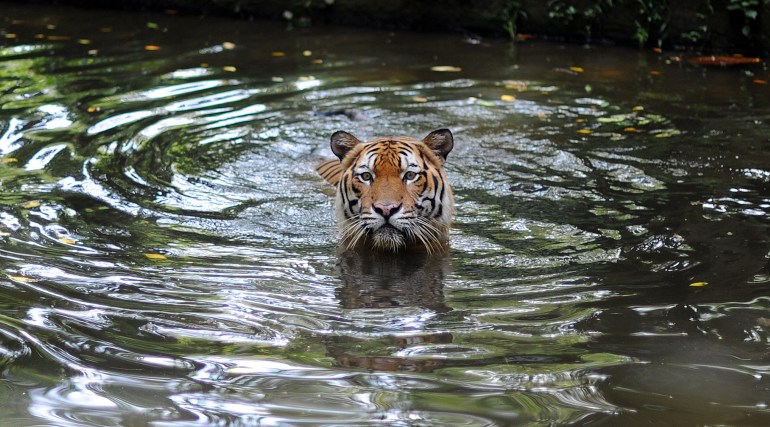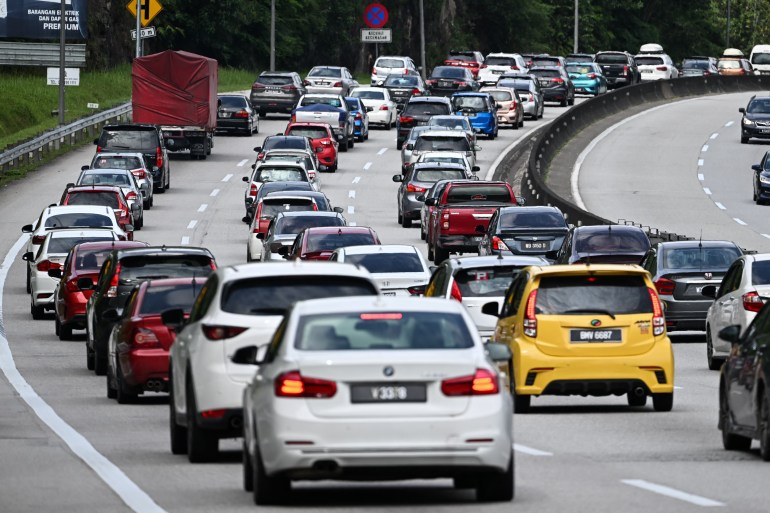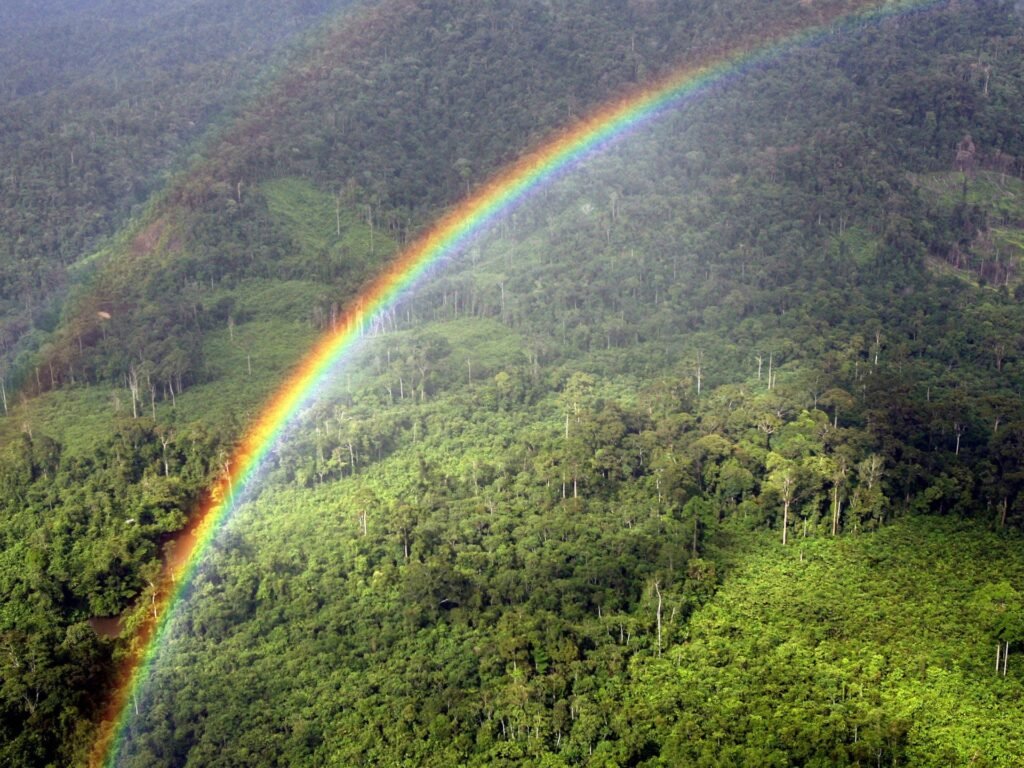This yr noticed a rise in pure disasters the world over, from floods in Libya and New York and lethal wildfires in Hawaii and Greece – all very actual results of local weather change.
Globally, there have been twice as many days the place temperatures exceed 50 levels Celsius (122 levels Fahrenheit) than 30 years in the past, with this yr being declared the hottest on record.
Malaysia is only one nation that has been going through its personal set of local weather points. In recent times it’s confronted an unprecedented rise in temperatures inflicting warmth islands to devastating floods, like those in 2021, displacing 1000’s as properties submerged underneath water.
Though the Southeast Asian state was as soon as criticised for its contribution to world warming, brought on by deforestation on land used for palm oil cultivation and extra just lately for its use of coal-fuelled energy stations – it’s additionally been on the forefront of local weather mitigation.
However its new minister for pure sources and environmental sustainability, Nik Nazmi, has stated extra must be executed. Since taking the helm of his nation’s local weather change measures final yr, he’s already stated no extra new palm oil plantations and coal vegetation.
As a substitute, he needs to extend electrical energy tariffs for the rich hoping to direct them in direction of different vitality, whereas persevering with to subsidise electrical energy and gas for the much less well-off.
Finally, steering his nation in direction of a extra sustainable way of life, he says, can’t be achieved by way of governmental insurance policies alone, however by way of altering mindsets and returning to shared human values.
Right here’s extra from Al Jazeera’s dialog with Nik Nazmi, Malaysia’s minister for pure sources and environmental sustainability:
Al Jazeera: Are you able to inform us extra about Malaysia’s local weather adaptation plan and when it’s anticipated to come back into motion?
Nik Nazmi: Our goal is for the Nationwide Adaptation Plan and the Local weather Change Act to be prepared by 2025.
It’s a multifaceted strategy that may cope with creating infrastructure.
In recent times we’ve confronted flooding, so we are attempting to maneuver away from impermeable surfaces like concrete and tarmac and in direction of different breathable supplies. We additionally need to construct extra properties and providers additional inland – as a result of Malaysia is a mountainous nation general, individuals are usually pushed to stay close to the coast or the river basins, however that additionally means lots of people are then uncovered if there’s a serious sea degree rise.
In the previous few years, the extent of warmth has been a lot greater than usual. We observed temperatures may be decrease in inexperienced areas in comparison with built-up areas – by as a lot as 6C (42.8F). We’re planning our cities utilizing a nature-based strategy, by planting extra greenery and parks. We are attempting to slowly transfer and alter in order that finally we will overcome the city warmth island impact.
Al Jazeera: Would you say Malaysia’s manufacturing of palm oil – the nation’s high crop for 3 many years – is contributing to this rise in world temperatures, as a number one contributor to deforestation and greenhouse gasoline (GHG) emissions?
Nazmi: It might have been at one time, however that isn’t the case now.
In Malaysia, most of our plantations, [98 percent] are lined, even the smallholders are lined, underneath the Sustainable Palm Oil initiative. It’s a transfer that has been recognised, even by worldwide research, in considerably reducing deforestation from palm oil.
Sure, now we have a really widespread sustainable palm oil trade, however there’s a restrict to the scale of our palm oil plantations. Each the timber trade and the palm oil trade in Malaysia are very a lot regulated.
There are not any new plantations deliberate.
Al Jazeera: However hasn’t the State of Kelantan been giving out concessions encouraging extra palm oil manufacturing? Is the federal authorities making an attempt to cease it?
Nazmi: Underneath our Structure, the state authority is in command of land and forests, and the federal authorities regulates and coordinates it.
If there was a difficulty in Kelantan the place the environmentally delicate areas have been deconstructed, and this consists of areas of everlasting forest reserves that are going to be given to a palm plantation, then they won’t get the Malaysian Sustainable Palm Oil certification.
Our Sustainable Palm Oil initiative has been a serious aspect in defending the forest, and it’s one thing we don’t get sufficient recognition for.
The Sustainable Palm Oil initiative has made an enormous distinction, however so has our Sustainable Forest Administration Programme. This appears at methods to guard the forest and permit it to redevelop, to regrow.
We’re a federation with land and forests all underneath state management. We give state governments a sure amount of cash for them to order their forests. The quantity relies on how giant the scale of the forest that they proceed to keep up is, whether or not they proceed so as to add to forest reserves, or whether or not they do some other initiatives to enhance that.
We used to pay 70 million ringgit a yr [$15m], however final yr – 2022-2023 – we managed to extend it to 150 million ringgit [$32m]. And for 2024, the Prime Minister has already introduced within the price range 200 million ringgit [$42.9m]. In order that’s a large quantity.
Is it sufficient? It’s not sufficient, nevertheless it’s begin. We’ve additionally had a nationwide Forestry Act, which was handed in 2022. Which means for state governments, they must do public inquiries earlier than they’ll work on any forests. In addition they must immediately substitute these forests, by replanting.
These are all of the issues that we tried to do with the intention to make it possible for we defend our best asset – the forest.
Al Jazeera: What in regards to the wildlife throughout the forests? Al Jazeera has lined the close to extinction of the Malayan Tiger earlier than – there at the moment are thought to now be lower than 100.
Nazmi: We have now a number of measures in place right here.
First, it’s about coping with the fragmentation of habitats, the lack of wildlife corridors, proper? When you construct a highway by way of a forest, or in the event you construct a plantation in that, then it is going to have an effect on the wildlife. You should still keep a good measurement of forest cowl, however in the event you cut up it up, then you recognize, animals like elephants and tigers, they want an enormous vary to journey. So we are attempting to maintain the forest intact as a lot as potential.
Sure, there are nonetheless some roads and rail, nevertheless it’s restricted. Locations the place it’s not possible for us to not have that infrastructure, we’re constructing wildlife crossings – secure areas for animals to cross roads and rail tracks – that’s within the works.

There’s additionally an ASEAN initiative referred to as the Coronary heart of Borneo, which covers the Malaysian states of Sabah and Sarawak, but in addition Brunei and Kalimantan, Indonesia. So it’s principally the North East centre of Borneo that could be a protected nature reserve, the place you have got pygmy elephants and orangutans.
And lastly, we even have an internationally acclaimed programme of Group Rangers, the place we work with navy veterans and Indigenous tribes – as a result of they know how one can transfer within the jungle. They assist to place boots on the bottom to cope with poachers, unlawful mining and deforestation. They’ve been very efficient from our research, by way of serving to to guard our tigers and elephants and different wildlife.
Al Jazeera: Malaysia is the third-largest producer of photo voltaic panels globally, and regardless of falling prices of photo voltaic expertise, adoption charges in Malaysia stay low, why is that?
Nazmi: It’s as a result of our electrical energy is so low-cost, it’s one of many most cost-effective within the area. Though our salaries are most likely greater than many nations within the area, the tariffs are among the many lowest and the subsidies are very excessive.
Up to now, you recognize, the federal government needed to draw traders, and cheaper electrical energy helped that, and the individuals working for these firms, additionally had subsidised electrical energy. That gained’t encourage individuals to put in photo voltaic and different issues, as a result of it’s simply cheaper to get it from the grid.
However since I took over in December final yr, we’ve progressively elevated the tariffs for electrical energy for each the larger companies and likewise for factories – but in addition for richer households.
The thought is that the subsidies must be focused, extra for the poor, and possibly a number of the center class, however actually not the wealthy. They’re the largest customers, utilizing air conditioners, garments dryers and swimming swimming pools. So it’s completely unfair.
We have now shifted away from that, and we’ve seen the clamour for photo voltaic has elevated tremendously, even for companies now. It’s partly due to new rules with regard to sustainability, but in addition as a result of now the electrical energy payments are greater, they complain, clearly. However after some time, then they began doing vitality effectivity and putting in photo voltaic. I imply, that makes financial sense. So I feel we’ll see that to be rising tremendously over the subsequent few years.
Al Jazeera: Isn’t the electrical energy in Malaysia primarily generated by coal? Why is coal nonetheless getting used there when different nations have moved away from it? And is something being executed to cut back its use?
Nazmi: Latest knowledge shows that in 2021 we’ve handed the height of coal utilization.
On the level of independence [from the British in 1957], lots of our vitality got here from diesel energy vegetation. After which once we had the rise in oil costs [in the 1970s], we began to make use of extra coal – keep in mind that is earlier than we had hydroelectricity. Coal continued to turn into extra fashionable within the early 2000s, due to value points on the time.
However now, we’ve declared that there’ll be no extra new coal vegetation in Malaysia.
The problem – that we settle for – is the economics of all of it, as a result of, not like many Western nations, our coal vegetation in Asia are usually youthful. So once you need to speak about retirement, it’s far more costly than in different nations.
We all know that it’s a grimy gas – and that’s why we’ve stated no new coal vegetation, and that’s why we’re methods to cut back the carbon from coal.
It needs to be executed in a simply and correct manner in order that the burden is just not then positioned on atypical Malaysian customers.
We’re additionally searching for a request for data to get concepts on how one can cut back carbon emissions from coal from early retirement of coal vegetation, however that’s nonetheless difficult.
We’ve seen what Indonesia is making an attempt to do and Vietnam is engaged on it, in addition to the Philippines. We’re mothballing, it’s what Germany and China did. And even co-firing, both with ammonia or biomass, so that you cut back emissions or transfer from brown to inexperienced – so slightly than coal, you can provide the identical firm a licence to make use of photo voltaic or different types of inexperienced vitality and slowly cut back.

Al Jazeera: Speaking about atypical Malaysian customers, they’ve the very best charges of per capita personal car possession within the area: Greater than 40 p.c of Malaysia’s complete vitality consumption comes from transport – are there plans to show this round?
Nazmi: Public transport is in fact one of the simplest ways ahead. In KL [Kuala Lumpur], we’re including a second line for the MRT [Mass Rapid Transit], a serious connector for the assorted rail traces within the metropolis, after which there’s the Gentle Rail Transit [LRT].
However on the similar time, we additionally recognise that we have to take a look at EVs [electric vehicles] as a result of individuals nonetheless want automobiles, and never everybody lives in areas with a developed public transportation system.
Al Jazeera: Is something being executed to vary mindsets? To get extra individuals keen to leap on a bus or a prepare, as a substitute of taking their very own personal automobiles?
Nazmi: Sure in fact. Gasoline right here is closely subsidised, however in the event you drive an enormous, luxurious automobile, like a Porsche, or BMW, you truly get extra subsidies than the man who rides a bike, in order that’s problematic and that’s why we’re working in direction of gas subsidies to be focused, the place solely the poor, and possibly a number of the center lessons may be given help.
So altering attitudes and habits. It’s not nearly going for an EV, as a result of the way in which you cost automobiles is totally different and wishes the infrastructure, the charging stations.
It additionally requires lots of political will, and the federal government is engaged on that. We are attempting to push each EV and public transport to go hand in hand slowly.
Al Jazeera: You had been at COP28 this yr and also you’ve stated the Loss and Injury Fund ought to do extra to cut back the burden on all growing nations – are you able to inform me extra?
Nazmi: The definition that’s at all times talked about, is it must be reserved for least developed nations and small island states, and positively they want it, I don’t query that.
However to restrict it to these nations alone… When you make it so small, then it makes it meaningless.
In Malaysia, now we have a big impact from local weather change. Sure, we’re center revenue, even maybe excessive center revenue. However, you must also take a look at the truth that Southeast Asia is a serious sufferer of local weather change – that makes it in the identical class as small island nations, proper?
Pakistan, Bangladesh, even Libya should not eligible. And naturally, they’ve been massively affected by floods and numerous calamities – and I feel that’s an issue.
As for the cash that’s been promised, the pledge, it’s been talked about since 2009. The 2015 Paris Settlement, acknowledged $100bn a yr from the developed world, proper? We at the moment are nearing $1 trillion, that must be the case proper now, however now we have $80bn – so there’s an enormous pledge, however there’s at all times a scarcity of cash within the financial institution.
We’re not simply talking on behalf of Malaysia, however we’re checked out as being one of many voices of the growing world, and we need to champion that.
Al Jazeera: You’ve additionally talked about the necessity for a world stocktake – why is that vital?
Nazmi: The worldwide stocktake underneath the UNFCCC is vital for us to evaluate the collective progress of implementing local weather actions in order that we will obtain the goals underneath the Paris Agreement.
For us, the science is obvious, we will see local weather change occurring in entrance of our eyes. And clearly, many nations have introduced their targets, the pledges, so it’s vital to have the worldwide stocktake, to see the place we’re at.
So we don’t delude ourselves, and we will perceive the urgency of reaching our targets, and to see what extra must be executed. Enterprise as typical is just not an possibility.
The subsequent step is the precept of fairness, you recognize, frequent however differentiated duty, nations which have executed this, they haven’t solely torched their very own forests, however they’ve additionally razed our personal forests, for a whole lot of years and turn into wealthy out of it. It’s time a number of the developed world nations busy increasing their very own oil fields stopped lecturing and carried out local weather measures.
Al Jazeera: How do you make sure that all this work that you simply’re doing, at governmental degree, is carried out on the grassroots ranges as properly?
Nazmi: There’s this good quote by this American environmental lawyer, Gus Speth, the place he talked about that he used to assume that the issue, the planetary disaster that we’re experiencing, is on account of local weather change, biodiversity loss, nevertheless it’s truly a difficulty of selfishness and spirituality.
That’s the center of it, proper, and that’s what must be addressed on the grassroots degree. On the similar time, you have got the poor, who should not even getting primary vitality, primary water to outlive, and you’ve got the wealthy who’re residing beyond the limit. So I feel working in direction of a “non secular and cultural transformation”, as Speth steered, is what’s most wanted.
In a rustic like Malaysia, faith is vital throughout the board, whether or not you’re Muslim, Christian, Hindu, Buddhist – so discovering frequent values to cope with local weather change, will work in direction of residing in a extra sustainable world, it’s vital.
We’ve launched a number of consciousness campaigns addressing these values, utilizing language and concepts which are universally understood – very primary values, like how one can be extra aware and never being wasteful, these are ideas inspired by all faiths, proper.
